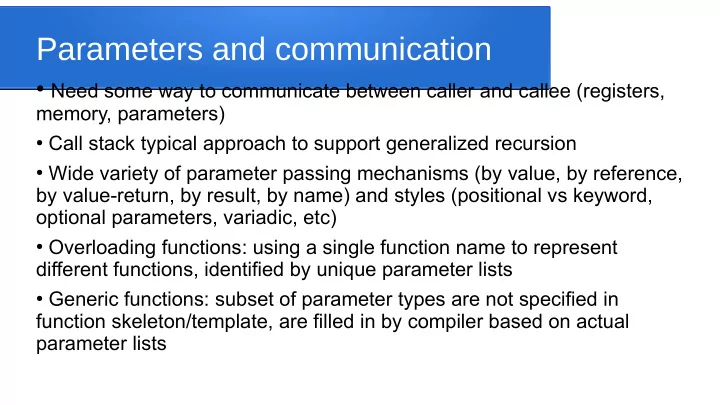

Parameters and communication ● Need some way to communicate between caller and callee (registers, memory, parameters) ● Call stack typical approach to support generalized recursion ● Wide variety of parameter passing mechanisms (by value, by reference, by value-return, by result, by name) and styles (positional vs keyword, optional parameters, variadic, etc) ● Overloading functions: using a single function name to represent different functions, identified by unique parameter lists ● Generic functions: subset of parameter types are not specified in function skeleton/template, are filled in by compiler based on actual parameter lists
Passing mechanisms ● By value (make copy, on stack or in heap with reference) ● By reference (implications for speed, memory, side effects) ● By value-return (copy to, copy back) ● By result (passing a variable to be “filled in”, either using reference or copying to stack then to target variable) ● By name (pass a name to callee, callee uses whichever variable is in most local scope with that name)
Parameter options ● Optional parameters (default values?), e.g. C++ or lisp ● Keyword vs positional parameters, e.g. lisp ● Variadic functions: arbitrary number of parameters, we’ve seen in lisp, can be done with macros in C or templates in C++ (will cover in the slides/video for lab 9)
Overloading functions ● Using the same name for a variety of functions, differentiated by parameter lists ● Compiler needs to be able to tell, from the actual parameters passed, which specific callee you wanted invoked ● Should this be checked at compile time, or run time? ● Implicit type conversion rules and optional parameters add complexity
Generic (e.g. templated) functions ● Subset of formal parameters are not given a type, function definition treated as a skeleton or template ● Compiler/interpretter examines actual calls to function to identify type used, compiler/intepretter generates full definition of callee based on those types ● Potential issues with seperate compilation (object file with function implementation may be compiled without knowledge of the calls from object files to be linked later)
Recommend
More recommend